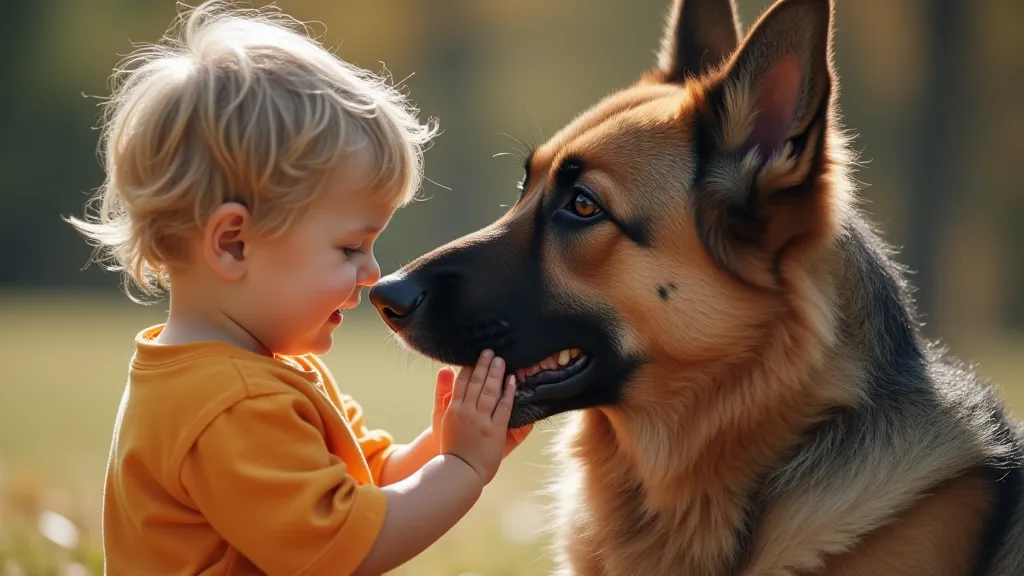Breed Profile: The Loyal and Protective German Shepherd
The German Shepherd Dog (GSD) is arguably one of the most recognizable and admired dog breeds worldwide. Known for their intelligence, loyalty, and protective nature, they're not just companions; they're working partners, family guardians, and often, heroic figures. Let’s delve into the world of the German Shepherd, exploring their history, temperament, care requirements, and potential health concerns.
A Working History: From Sheep Herder to Global Icon
As the name suggests, the German Shepherd's origins lie in Germany. In the late 19th century, Captain Max von Stephanitz sought to create a herding dog that was not only efficient but also possessed exceptional intelligence, courage, and obedience. He crossed various sheepdog breeds from different regions of Germany, establishing the foundation for the modern GSD. Their initial purpose was to herd sheep, but their versatility and trainability quickly led to their adoption by police forces, military units, and search and rescue organizations. Their role in World War I and II further solidified their image as courageous and reliable dogs. Understanding the emotional toll abandonment can take on dogs, particularly those who may have experienced it, can provide valuable insight into the challenges they face and how to best support them. Resources exploring the frayed leash can offer a deeper understanding.

Temperament and Personality: More Than Just a Guard Dog
While their protective instincts are undeniable, German Shepherds are also incredibly affectionate and loyal to their families. They thrive on human interaction and form strong bonds with their owners. Early socialization is crucial to ensure they develop into well-adjusted adults. Without proper socialization, their protective nature can manifest as fear-based aggression. They are generally good with children they’re raised with but supervision is always recommended due to their size and energy. Their intelligence makes them highly trainable, but they require a confident and consistent handler. Proper nutrition plays a vital role in their overall health and temperament; learning about dog food nutrition can help ensure your GSD receives the optimal balance of nutrients. Recognizing the importance of a balanced diet and proactive health management can contribute significantly to your German Shepherd’s well-being.
Training: Channeling Intelligence and Energy
German Shepherds are naturally inclined to learn and excel in obedience training. Positive reinforcement methods work best. They enjoy having a job to do, so activities like agility, herding, and scent work are excellent outlets for their energy and intelligence. Puppy training should begin as early as possible, focusing on basic commands and socialization. Consistency is key - setting clear boundaries and expectations from the start will help shape them into well-behaved companions. Because of their herding instincts, they might try to "herd" children or other pets – redirection and training can help manage this behavior. It’s often helpful to build trust and establish clear communication through consistent training. If you're struggling with unwanted behaviors, you may find helpful information about dealing with dog barking and other common challenges. A structured training program also helps to solidify the bond between owner and dog.
Grooming: Keeping that Iconic Coat Looking its Best
The German Shepherd’s double coat requires regular grooming to prevent matting and skin issues. Brushing several times a week, especially during shedding season (spring and fall), is essential. Bathing should be done only when necessary, as frequent bathing can strip the coat of its natural oils. Pay attention to their paws, as they are prone to dry skin and cracking. Regular nail trims and ear cleaning are also important aspects of their grooming routine. To maintain a healthy and vibrant coat, it’s crucial to understand how proper nutrition impacts skin and fur. Remember that healthy skin is the foundation of a beautiful coat.

Health Considerations: Potential Concerns and Prevention
Like all breeds, German Shepherds are predisposed to certain health issues. It's vital to be aware of these potential concerns and take preventative measures. Understanding common dog health problems can help you proactively address potential issues and keep your GSD healthy and happy. Responsible breeding practices and early detection are key to mitigating these risks. Choosing a reputable breeder is crucial; they should be transparent about the health history of their dogs and willing to provide documentation.
- Hip and Elbow Dysplasia: A malformation of the hip or elbow joints. Responsible breeders screen their dogs for this condition. This is often linked to rapid growth, emphasizing the importance of a balanced diet. Maintaining a healthy weight and ensuring proper joint support can also help manage this condition.
- Bloat (Gastric Dilatation-Volvulus): A life-threatening condition where the stomach twists. Prevention often involves feeding smaller meals throughout the day and avoiding vigorous exercise immediately before or after eating. Understanding the anatomy and physiology of the digestive system can offer valuable insights into preventing bloat.
- Degenerative Myelopathy: A progressive spinal cord disease. While there’s no cure, early detection and management can help improve quality of life. Further research into the genetic factors contributing to this condition is ongoing.
- Pancreatic Insufficiency: A condition where the pancreas doesn't produce enough enzymes to digest food. Supplementation with digestive enzymes is often necessary. Careful monitoring of their diet and response to food is crucial.
A breeder should be able to provide detailed information about the health history of their dogs and any screening results. Furthermore, unethical breeding practices can contribute to various health and behavioral issues. A commitment to responsible breeding is a key indicator of a trustworthy breeder. Reputable breeders prioritize the long-term health and temperament of their dogs, selecting breeding pairs carefully.
Finding a German Shepherd: Breeder vs. Rescue
If you're considering adding a German Shepherd to your family, you have two main options: purchasing from a reputable breeder or adopting from a rescue organization. If you choose a breeder, research their practices, ask about health clearances, and visit their facility. Be wary of breeders who don’t allow visits or are unwilling to answer your questions. Rescue organizations often have German Shepherds of all ages and backgrounds looking for loving homes. Adopting a rescue dog can be incredibly rewarding and gives a deserving dog a second chance. Consider the emotional toll abandonment can take on dogs; they may require extra patience and understanding as they adjust to their new environment. Resources exploring the frayed leash can offer a deeper understanding of these challenges.

Caring for a German Shepherd Puppy: A Detailed Guide
Bringing home a German Shepherd puppy is an exciting time, but it also comes with significant responsibilities. Early socialization is paramount. Expose your puppy to a wide variety of people, places, and sounds to help them develop into well-adjusted adults. Enroll in puppy obedience classes to learn basic commands and socialize with other dogs. Nutrition is also critical. Feed your puppy a high-quality puppy food formulated for large breeds, paying attention to the calcium to phosphorus ratio to promote healthy bone development. Be sure to follow your veterinarian's recommendations regarding vaccinations and parasite prevention. Remember that patience and consistency are key to success. Providing a stimulating and supportive environment is crucial for their physical and mental development.
The Importance of Exercise and Mental Stimulation
German Shepherds are energetic dogs that require a significant amount of exercise. Daily walks, runs, or play sessions are essential to keep them physically and mentally stimulated. In addition to physical exercise, it’s important to provide them with mental stimulation. Puzzle toys, training games, and interactive activities can help prevent boredom and destructive behaviors. A tired dog is a happy dog! Activities like herding trials, agility courses, or even scent work games can provide a challenging and rewarding outlet for their intelligence and energy. They thrive on having a purpose and a job to do.
Conclusion: A Loyal Companion for the Right Family
The German Shepherd Dog is a truly remarkable breed – intelligent, loyal, and protective. However, they are not the right breed for everyone. They require a dedicated owner who is willing to invest the time and effort required for training, socialization, and proper care. If you’re prepared to meet their needs, you’re likely to gain a lifelong companion and a truly rewarding experience. They thrive in environments where they have a purpose and a loving family to call their own. The journey of owning a German Shepherd is an enriching experience, filled with loyalty, companionship, and countless moments of joy.





